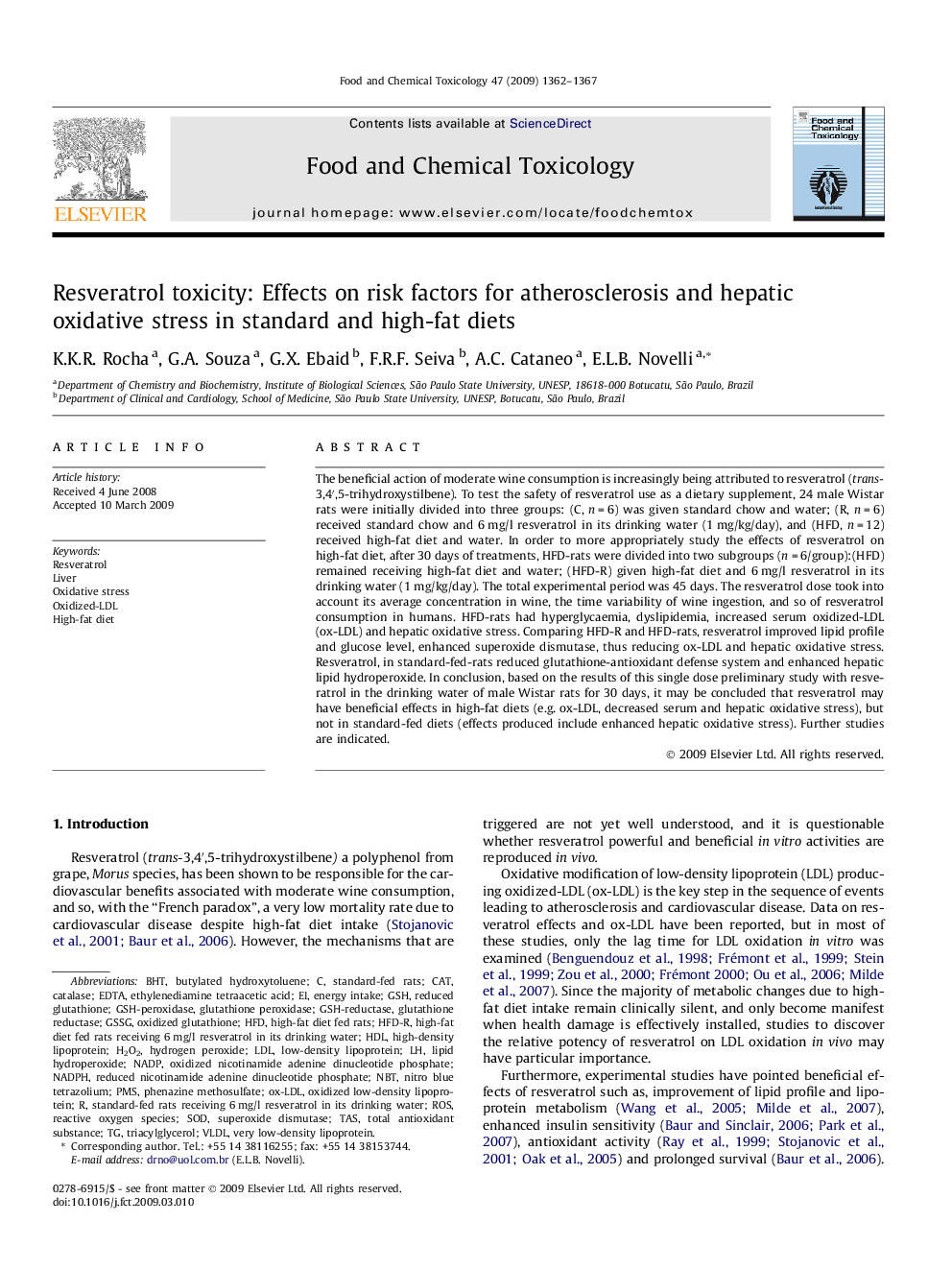| Article ID | Journal | Published Year | Pages | File Type |
|---|---|---|---|---|
| 5854444 | Food and Chemical Toxicology | 2009 | 6 Pages |
Abstract
The beneficial action of moderate wine consumption is increasingly being attributed to resveratrol (trans-3,4â²,5-trihydroxystilbene). To test the safety of resveratrol use as a dietary supplement, 24 male Wistar rats were initially divided into three groups: (C, n = 6) was given standard chow and water; (R, n = 6) received standard chow and 6 mg/l resveratrol in its drinking water (1 mg/kg/day), and (HFD, n = 12) received high-fat diet and water. In order to more appropriately study the effects of resveratrol on high-fat diet, after 30 days of treatments, HFD-rats were divided into two subgroups (n = 6/group):(HFD) remained receiving high-fat diet and water; (HFD-R) given high-fat diet and 6 mg/l resveratrol in its drinking water (1 mg/kg/day). The total experimental period was 45 days. The resveratrol dose took into account its average concentration in wine, the time variability of wine ingestion, and so of resveratrol consumption in humans. HFD-rats had hyperglycaemia, dyslipidemia, increased serum oxidized-LDL (ox-LDL) and hepatic oxidative stress. Comparing HFD-R and HFD-rats, resveratrol improved lipid profile and glucose level, enhanced superoxide dismutase, thus reducing ox-LDL and hepatic oxidative stress. Resveratrol, in standard-fed-rats reduced glutathione-antioxidant defense system and enhanced hepatic lipid hydroperoxide. In conclusion, based on the results of this single dose preliminary study with resveratrol in the drinking water of male Wistar rats for 30 days, it may be concluded that resveratrol may have beneficial effects in high-fat diets (e.g. ox-LDL, decreased serum and hepatic oxidative stress), but not in standard-fed diets (effects produced include enhanced hepatic oxidative stress). Further studies are indicated.
Keywords
NADPGSSGNBTHFDGSHNADPHHDLVLDLCATPMSOx-LDLBHThigh-density lipoproteinTASROSHydrogen peroxideEDTAethylenediamine tetraacetic acidOxidized-LDLoxidized nicotinamide adenine dinucleotide phosphatenitro blue tetrazoliumtriacylglycerolOxidative stressResveratrolhigh-fat dietSODSuperoxide dismutasephenazine methosulfateOxidized low-density lipoproteinvery low-density lipoproteinLow-density lipoproteinLDLEnergy intakeLipid hydroperoxideH2O2butylated hydroxytolueneCatalasereduced nicotinamide adenine dinucleotide phosphatereduced glutathioneLiveroxidized glutathioneglutathione reductaseglutathione peroxidaseReactive oxygen species
Related Topics
Life Sciences
Agricultural and Biological Sciences
Food Science
Authors
K.K.R. Rocha, G.A. Souza, G.X. Ebaid, F.R.F. Seiva, A.C. Cataneo, E.L.B. Novelli,
